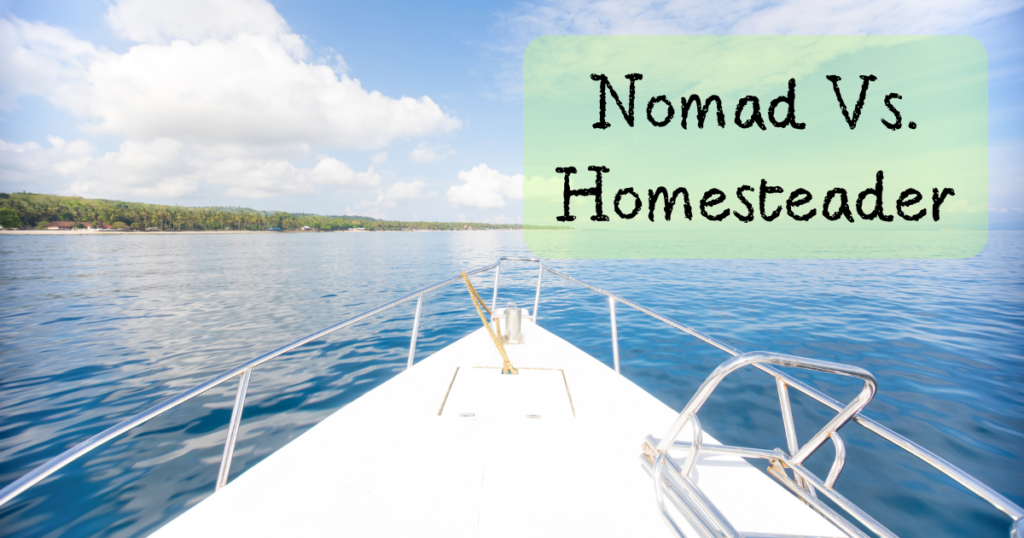The irresistible draw of the open road, wide and free, no set arrival time, no deadlines, just getting there when we get there and seeing what we see, has fueled many imaginations. It is the antithesis of the work-save-retire life path that is supposed to be the best way to live in this world. It is a trend that many people young and old, myself included, have decided to embrace, and at first, it’s a wonderful lifestyle.
As someone who has lived a nomadic life on a boat for five years, I understand the attraction. There is a kind of joy in not having a lot of possessions, in living simply and being able to go to amazing places, to be in nature, and still keep your comfortable bed and favorite foods around. However, after a few years of this, I realized it was a real pain not having a permanent address, not knowing where I was going to be in two months, where basic necessities like showers, electricity, and wi-fi became luxuries. Sure I liked going places, but to be in a permanent state of going and never having a place to just stay began to wear upon my soul.
When I added in having a growing child to the mix, things became more complicated. Living a nomadic life with young children is way easier than having a teen in a small space wondering when he was going to see his friends, or do his favorite activity. On the other hand, educating children on the road was actually rewarding even if it required some creativity. My son got to experience things most children could only imagine. But something happens after age 10 or 11. A young person needs more than moving places every few weeks and living in close quarters with their parents. I could clearly see the nomadic life was not serving my young teen and decisions had to be made.
When I left the boat, I also had to leave the father of my child. My ex felt boat living was a great lifestyle. He lived it for 50 years and had no desire to change, neither for his son, nor to accommodate his own old age (it was getting harder and harder to physically maintain the boat). I was beginning to feel like we were one step above homelessness and I did not like that feeling at all. How could we be living in New York City and not have basic things like heat in the winter, an address, or the ability to charge our phones as needed (forget charging computers, cameras, having a fridge, or anything else electrical). There were also challenges getting on and off the boat, especially if conditions were icy. How could he think this was a good place for his family?
When people talk about van life and how great it is. I know all the things they have to deal with because I’ve lived that lifestyle and it’s not all great. A couple on a grand adventure or a young family can get a lot out of it for a few years, maybe two or three, but this is no formula for decades of life, especially if children are involved. Most nomads don’t have very much in savings, have no homes they can offer another shelter in, and can’t do much for family should the need arise. As a matter for fact, family are often helping them on various levels. I don’t think this is a good way to live long-term.
I think homesteads are a much better option for a solid future. Not only do homesteads offer a degree of autonomy that standard housing does not, but it is a stable place to raise a family, to take care of extended family if need be, to keep heirlooms for the future generation to inherit, to be a safe place to land when adult children need to hit the restart button, to have a nice retirement, and for the constant hustle for food and shelter to be a moot point. Can you imagine inviting your old mom who can barely survive without help to come live in a van, tiny home, or boat with you? It’s absurd. Living tiny and or nomadic is for people who don’t have responsibilities.
When we take a moment to think long term about our families and our own old age, we can put our energy towards better solutions for everyone involved. The next generation can start life ahead of where their parents did. They can start life with basic necessities already secured and instead take on creative and innovative tasks. No one who is constantly stressed about acquiring food and shelter can possibly be working on inventing a time machine or ways to fully tap into the possibilities of photovoltaic paint or any other potentially useful solutions to humanity’s problems.
A nomadic lifestyle for a few years is a great learning experience. It makes wonderful bonding moments for a couple or a young family, but then having a stable home to return to is also important. Your teen children are not going to want to share a room with multiple siblings within arm’s reach. You’re older self is not going to appreciate having to get down under and in between tight spaces to fix something. And it is unfair to expect extended family or friends to fill in gaps you should be able to provide for yourself (i.e storage space or receiving mail).
Now that I am out of the cruising life, I can finally look at purchases that offer multi-year long use instead of knowing it will probably be gone by next year. I can sign my son up for things that I know he can continue to participate in three months from now. Who knows? He might make a friend he’s met more than once. He might find an interest outside of mine and I’d be glad that he did. The best part though is that we have electricity, hot water, showers everyday, wi-fi and heat when temps are freezing. It’s not an extended survival camping trip lasting too long with no hope for anything else in the coming months or years.
To be fair, I haven’t fully embraced the work-save-retire lifestyle either. I think I’d rather work to build my own home, plant a garden and small orchard in my youth knowing it will be there for me when I retire, and that home will be inherited by family, rather than buying a home with an eye towards gaining equity and selling it in a few years. The homestead will provide food and shelter in my mature years and then the same for the next generation as well.
It was my nomadic years that allowed me to truly appreciate the value of a homestead. This is not to say no one should be nomadic. There is a lot to be gained from traveling and living tiny. However, there is a clear choice when it comes to a sustainable future that benefits all members of the family. I would choose setting roots in the land over being a nomad any day of the week.




